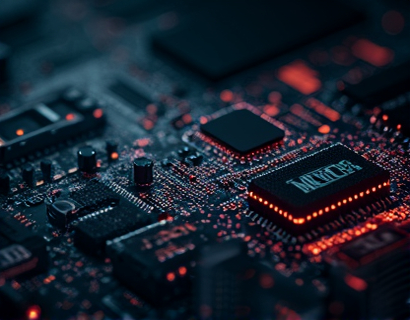Smart Contract Automation for Efficient Dividend and Payment Distribution
In the rapidly evolving landscape of FinTech, the integration of smart contract technology has emerged as a transformative force in financial management. This innovative approach is revolutionizing the way businesses handle financial obligations, particularly in the distribution of dividends, earnings, and scheduled payments. By automating these processes, smart contracts offer a secure, transparent, and efficient solution that enhances financial control and streamlines operations.
The Need for Automation in Financial Obligations Management
Traditional methods of managing financial obligations are often cumbersome and prone to errors. Manual processes require significant time and resources, increasing the risk of delays and inaccuracies. In contrast, smart contract automation provides a reliable and consistent method for handling financial transactions. This technology ensures that payments are executed precisely as per the agreed terms, reducing the potential for disputes and enhancing trust among stakeholders.
How Smart Contracts Work
Smart contracts are self-executing contracts with the terms of the agreement directly written into code. They run on a blockchain network, which provides a decentralized and immutable ledger for transactions. When the predefined conditions are met, the smart contract automatically triggers the payment or action, without the need for intermediaries. This automation not only speeds up the process but also minimizes the risk of human error and fraud.
Key Components of Smart Contract Automation
- Decentralization: Smart contracts operate on a blockchain, eliminating the need for central authorities and reducing the risk of single points of failure.
- Transparency: All transactions are recorded on the blockchain, providing a clear and verifiable history of all activities.
- Automation: Once the conditions are met, the contract executes the payment or action automatically, ensuring timely and accurate distributions.
- Security: The use of cryptographic techniques ensures that transactions are secure and tamper-proof.
Benefits of Smart Contract Automation for Businesses
The adoption of smart contract automation in financial management offers numerous benefits for businesses of all sizes. These include:
Enhanced Efficiency: Automated processes reduce the time and effort required to manage financial obligations, allowing businesses to focus on core operations.
Cost Reduction: By eliminating intermediaries and reducing manual processing, businesses can significantly lower operational costs.
Increased Accuracy: Smart contracts minimize the risk of human error, ensuring that payments are made correctly and on time.
Improved Trust: The transparency and immutability of blockchain technology build trust among stakeholders, as all transactions are verifiable and auditable.
Scalability: Smart contract solutions can handle a large volume of transactions seamlessly, making them ideal for businesses with complex financial obligations.
Use Cases in Dividend and Payment Distribution
Smart contract automation is particularly beneficial in scenarios involving regular and predictable financial distributions, such as dividend payments to shareholders, employee bonuses, and vendor payments. Here are some specific use cases:
Dividend Distribution: Companies can use smart contracts to automate the distribution of dividends to shareholders based on predefined criteria, such as ownership percentage and profit thresholds. This ensures that dividends are paid out promptly and accurately, enhancing shareholder satisfaction.
Employee Payments: For businesses with global workforces, smart contracts can facilitate timely and accurate salary payments, taking into account various factors like tax regulations and currency conversions. This streamlines the payroll process and reduces the risk of errors.
Vendor Payments: Automating vendor payments through smart contracts ensures that payments are made on schedule, regardless of the complexity of the payment terms. This improves cash flow management and strengthens relationships with suppliers.
Implementing Smart Contract Automation
Implementing a smart contract automation solution involves several key steps:
1. Define Requirements
The first step is to clearly define the financial obligations and the conditions under which payments should be made. This includes identifying the parties involved, the amount to be paid, and the triggers for execution.
2. Choose a Blockchain Platform
Select a suitable blockchain platform that supports smart contract development. Popular options include Ethereum, Hyperledger, and Corda, each with its own set of features and capabilities.
3. Develop the Smart Contract
With the requirements and platform in place, the next step is to develop the smart contract. This involves writing the code that defines the logic and conditions for the payment execution. It is crucial to ensure that the contract is well-tested to avoid any bugs or vulnerabilities.
4. Deploy and Test
Once the smart contract is developed, it needs to be deployed on the blockchain network. Rigorous testing is essential to validate the contract's functionality and ensure it behaves as expected under various scenarios.
5. Integrate with Existing Systems
To maximize the benefits, the smart contract solution should be integrated with the business's existing financial systems. This ensures seamless data flow and coordination between different processes.
Challenges and Considerations
While the benefits of smart contract automation are significant, there are also challenges and considerations to keep in mind:
Regulatory Compliance: Businesses must ensure that their use of smart contracts complies with local and international regulations, particularly in areas like data privacy and financial reporting.
Technical Expertise: Implementing smart contract solutions requires a certain level of technical expertise. Companies may need to invest in training or hire specialists to manage the implementation and maintenance.
Interoperability: Ensuring that smart contracts can interact with different systems and platforms is crucial for businesses with diverse technological ecosystems.
Security: Although smart contracts are secure by design, it is essential to continuously monitor and update the contracts to address any emerging security threats.
Future Trends in Smart Contract Automation
The field of smart contract automation is rapidly evolving, with several trends shaping its future:
Increased Adoption: More businesses are recognizing the value of smart contracts, leading to wider adoption across various industries.
Enhanced Interoperability: Efforts to improve interoperability between different blockchain platforms will enable more seamless integration and collaboration.
Advanced Use Cases: As the technology matures, new and more complex use cases will emerge, expanding the potential applications of smart contracts beyond financial management.
Regulatory Clarity: As the use of smart contracts becomes more prevalent, regulatory bodies are likely to provide clearer guidelines, fostering greater confidence and adoption.
Conclusion
Smart contract automation represents a significant advancement in financial management, offering businesses a powerful tool to streamline the distribution of dividends, earnings, and scheduled payments. By leveraging the security, transparency, and efficiency of blockchain technology, companies can enhance their financial control and operational efficiency. As the technology continues to evolve, the potential for innovation and improvement in financial processes is vast, making smart contract automation an essential consideration for businesses looking to stay ahead in the competitive landscape.











































